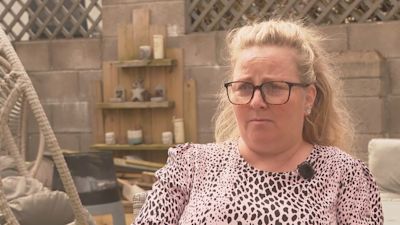Cost of living crisis means fulfilling disabled children's needs 'even more expensive'

Watch the video report by ITV Cymru Wales reporter, Hamish Auskerry
The cost of living is hitting many families very hard, but this is especially the case for those with disabled children.
Rachel Rankmore's son Bailey has a severe case of epilepsy. She says the cost of living crisis is adding even more financial pressure on families of children with disabilities.
With fuel prices going up, fulfilling Bailey's complex needs has become even more expensive for the family to tackle.
She said: "He has a vehicle that get's him around and again, diesel and petrol prices have gone up which [means] we're going to have to cut down on the visits he does in the community, which is going to be sad because Bailey thrives on being out and about."
It comes as the Children's Commissioner urged the Welsh Government to set ambitious new targets to reduce child poverty levels in Wales. Rocio Cifuentes has said that young people from ethnic minorities, and disabled children could be particularly vulnerable from the cost of living crisis.
According to figures published last year by the UK Government, people in Pakistani and Bangladeshi households were consistently the most likely out of all ethnic groups to live in low-income households.
The charity Scope estimates that families with disabled children face extra costs of £581 per month.
Rocio Cifuentes added that the Welsh Government should publish a new child poverty action plan to show how it will target support at children over the coming months, and how those actions will reach financially marginalised communities.
The Commissioner, who started her job last month, also announced a new national consultation to hear about the issues that matter most to children, young people, and their families.
She said: "We know that the cost of living crisis is having, and is going to keep having a huge impact on children and their families across the country. It's going to affect children of all backgrounds and in every corner of Wales. There will be worried parents and children who want to know exactly what the Government will be doing to help them.
"What I'd really like to see is a clear plan from the Welsh Government on how they are going to target support at children, how they are going to listen to families, and how they are going to do all they can to support them through this crisis, so that I can hold them to their promises. And they really need to make sure that the support reaches communities who we know traditionally don't always get the support they need."
"I know there has been a council tax rebate for many families across Wales, but in the context of unprecedented utility bill hikes, historically high fuel prices, and a population with already the highest levels of child poverty in the UK, it doesn't go far enough for families.
"And we've just been through a really traumatic two years that my own office's research has shown has had a disproportionately high impact on children from ethnic minorities, and disabled children. So we are going from one crisis straight into another, and both crises have been and will be particularly devastating for those groups.
In response, a Welsh Government spokesperson said: "The key levers for tackling child poverty - powers over the tax and welfare system - sit with the UK Government. We will continue to do all we can with the powers we have to tackle inequalities and improve outcomes for all children in Wales so they can fulfil their potential.
"The pandemic and the cost-of-living crisis have had a huge impact on people living in poverty and near the poverty line. Since November, we have provided more than £380m in additional funding to support households affected by the crisis.
"The Minister for Social Justice has given a commitment to publish a refreshed Child Poverty Strategy during this Senedd term."
The UK Government says it's committed to ending poverty and the latest figures show there were half a million fewer children in absolute poverty after housing costs than in 2009/10.
A spokesperson said: “We recognise the pressures on the cost of living and we are doing what we can to help, including spending £22 billion across the next financial year to support people with energy bills and cut fuel duty.
“For the hardest hit, we’re putting an average of £1,000 more per year into the pockets of working families on Universal Credit, have also boosted the minimum wage by more than £1,000 a year for full-time workers and our Household Support Fund is there to help with the cost of everyday essentials.”